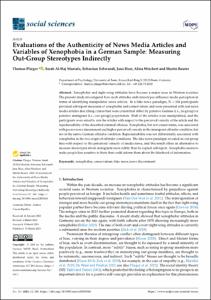Evaluations of the Authenticity of News Media Articles and Variables of Xenophobia in a German SampleMeasuring Out-Group Stereotypes Indirectly

Evaluations of the Authenticity of News Media Articles and Variables of Xenophobia in a German Sample
Measuring Out-Group Stereotypes Indirectly

| dc.contributor.author | Plieger, Thomas | |
| dc.contributor.author | Al-Haj Mustafa, Sarah | |
| dc.contributor.author | Schwandt, Sebastian | |
| dc.contributor.author | Heer, Jana | |
| dc.contributor.author | Weichert, Alina | |
| dc.contributor.author | Reuter, Martin | |
| dc.date.accessioned | 2023-05-02T09:39:55Z | |
| dc.date.available | 2023-05-02T09:39:55Z | |
| dc.date.issued | 11.03.2023 | |
| dc.identifier.uri | https://hdl.handle.net/20.500.11811/10820 | |
| dc.description.abstract | Xenophobic and right-wing attitudes have become a major issue in Western societies. The present study investigated how such attitudes and stereotypes influence media perception in terms of identifying manipulated news articles. In a fake news paradigm, N = 326 participants provided self-report measures of xenophobia and conservatism, and were presented with real news media articles describing crimes that were committed either by putative German (i.e., in-group) or putative immigrant (i.e., out-group) perpetrators. Half of the articles were manipulated, and the participants were asked to rate the articles with respect to the perceived veracity of the article and the reprehensibility of the described criminal offences. Xenophobia, but not conservatism, was associated with poorer news discernment and higher perceived veracity in the immigrant offender condition, but not in the native German offender condition. Reprehensibility was not differentially associated with xenophobia in the two origin-of-offender conditions. The fake news paradigm revealed an out-group bias with respect to the perceived veracity of media news, and this result offers an alternative to measure stereotypes about immigrants more subtly than by explicit self-report. Xenophobia seems to make people less sensitive to hints that could inform them about the falsehood of information. | en |
| dc.format.extent | 13 | |
| dc.language.iso | eng | |
| dc.rights | Namensnennung 4.0 International | |
| dc.rights.uri | http://creativecommons.org/licenses/by/4.0/ | |
| dc.subject | xenophobia | |
| dc.subject | conservatism | |
| dc.subject | fake news | |
| dc.subject | news discernment | |
| dc.subject.ddc | 150 Psychologie | |
| dc.subject.ddc | 300 Sozialwissenschaften, Soziologie, Anthropologie | |
| dc.title | Evaluations of the Authenticity of News Media Articles and Variables of Xenophobia in a German Sample | |
| dc.title.alternative | Measuring Out-Group Stereotypes Indirectly | |
| dc.type | Wissenschaftlicher Artikel | |
| dc.publisher.name | MDPI | |
| dc.rights.accessRights | openAccess | |
| dcterms.bibliographicCitation.volume | 2023, vol. 12 | |
| dcterms.bibliographicCitation.issue | iss. 3 | |
| dcterms.bibliographicCitation.pagestart | 1 | |
| dcterms.bibliographicCitation.pageend | 13 | |
| dc.relation.doi | https://doi.org/10.3390/socsci12030168 | |
| dcterms.bibliographicCitation.journaltitle | Social Sciences | |
| ulbbn.pubtype | Zweitveröffentlichung | |
| dc.version | publishedVersion | |
| ulbbn.sponsorship.oaUnifund | OA-Förderung Universität Bonn |
Files in this item
This item appears in the following Collection(s)
-
Publikationen (7)




